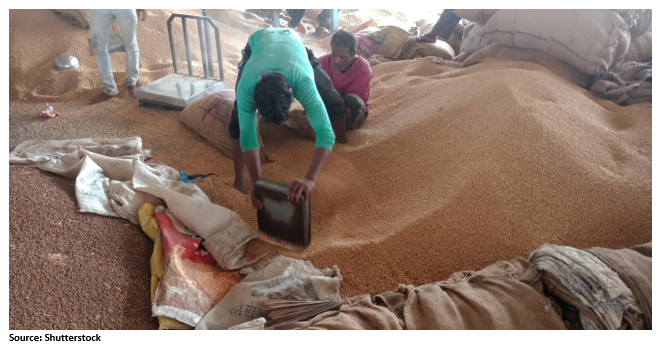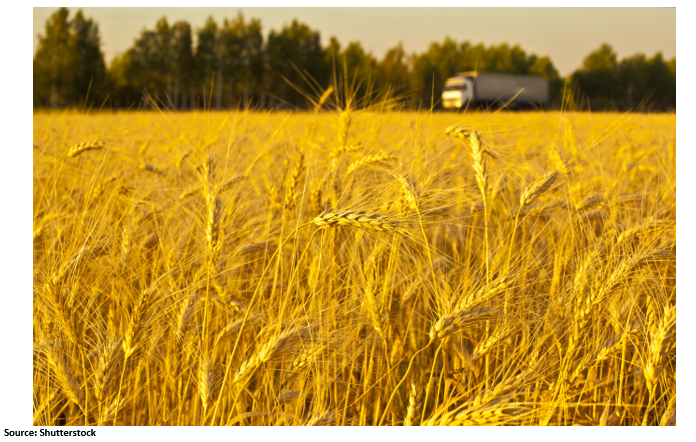- Bread protests break out in Iran
- India bans private wheat exports
- EU looks to help Ukraine export food
Top politicians from around the world are becoming increasingly alarmed at the food crisis caused by Ukraine’s inability to export grain via its Black Sea ports.
Risk consultancy Verisk Maplecroft said the worst effects of the surge in food and fuel prices caused by Russia’s invasion of Ukraine have yet to kick in, particularly in middle-income countries. It said it had identified 10 emerging economies to watch because of the risk of destabilising unrest this year: Argentina, Brazil, Egypt, Tunisia, Lebanon, Senegal, Kenya, Pakistan, Bangladesh, and The Philippines.
French Foreign Minister Jean-Yves Le Dian was quoted by the BBC as saying leaders now have to deal with the war in Ukraine as a long-lasting conflict that would spawn serious consequences around the world.
“I’d also make the point that we now have to deal with a conflict that is going to last and therefore also to deal in the long term with the consequences of this conflict at the international level and particularly in the field of food security,” he said.
Indian Export Ban

In a further shock to global grains markets, the Indian government announced a ban on private wheat exports, the Moneycontrol website reported. It quoted Commerce Secretary BVR Subrahmanyam as saying that the move was aimed at controlling rising domestic prices and meeting the food requirements of India’s neighbours and vulnerable countries. He added that flour prices had risen by about 40% in some parts India. “We have kept the window open for neighbours. We have also kept the window open for a large number of vulnerable countries if their governments do make such requests,” Subrahmanyam said. Exports for which letters of credit had been issued before the ban on May 13 would be allowed.
Governments Wrestle with Food Crisis
In Egypt, annual inflation rose to 14.9% in April from 12.1% in March and 4.1% a year earlier, Al-Ahram reported, citing the Central Agency for Public Mobilisation and Statistics. Food and beverage price inflation far outstripped April’s headline number at 29.3%.

However, there was a boost to domestic food security with the start of operations at the largest sugar factory in the world by the Canal Sugar Company in southern Egypt. The Brazil-Arab News Agency said the factory can produce 900k tonnes a year of sugar from beet. The company aims to develop and reclaim 181,000 acres of desert land using groundwater, to produce 2.5 million tonnes of sugar beet per year, and other strategic crops such as wheat, corn and chickpeas.
In Tunisia, the government was forced to raise some food prices after farmers protested against an increase in the prices of barley used as animal feed and energy, Reuters said.
Senegal’s president, Macky Sall has announced “emergency “cash transfers of around USD 127 each to more than half a million households to help them cope with the economic fallout from the war in Ukraine and the Covid pandemic, africanews reported.
Economy Minister Amin Salam told Reuters that the World Bank has approved a USD 150 million loan to help Lebanon fund wheat imports and keep bread prices stable for nine months.
The program, known as the Lebanon Wheat Supply Emergency Response Project, still needs approval by the country’s cabinet and parliament, Salam added.
In Brazil, the Economy Ministry removed import tariffs on food products such as beef, chicken, wheat and wheat flour, crackers and biscuits, corn and other bakery products until year-end, Reuters reported.
The Brazilian government also called for the creation of a global agreement to allow food and fertilizer corridors to be created, preventing the war in Ukraine or sanctions against Russia from disrupting markets and agricultural supplies, Brazil Posts reported.
However, in Iran Soaring bread prices have triggered protests in which some shops were set on fire, prompting police to arrest scores of “provocateurs”, Reuters reporting, citing the official IRNA news agency. The protests were triggered by a cut in government subsidies for imported wheat that caused price hikes as high as fourfold for a variety of flour-based staples.
Search for Solutions

The EU announced a programme called “Solidarity Lanes” to help Ukraine export agricultural goods. “Twenty million tonnes of grains have to leave
Ukraine in less than three months using EU infrastructure. This is a gigantic challenge,” EU Transport Commissioner Adina Vălean said.
The European Commission said it had set up a matchmaking logistics platform and urged EU rail logistics operators to make additional freight rolling
stock, vessels and lorries availability as a matter of urgency.
The EC also called on rail operators to prioritise timetable slots for Ukrainian agricultural exports and for to move market players to urgently transfer mobile grain loaders to the relevant border terminals to speed up transhipment because of the change of gauge between the Ukrainian and EU rail systems. It added that it would also help secure storage space for Ukrainian exports within the EU.
Agriculture Commissioner Janusz Wojciechowski was quoted as saying by the Politico website that the EU had to counterbalance what he called Russia’s deliberate destruction of Ukraine’s agriculture by expanding export channels and counter Moscow’s efforts to portray itself as a humanitarian actor that was feeding the world in a worsening food crisis.
Ukraine can export no more than 1.5 million tonnes of agricultural products a month because of the Russian blockade of its ports, Reuters reported, citing First Deputy Agriculture Minister Taras Vysotskiy. Before the invasion Ukraine could export 5 million tonnes a month, Vysotskiy said.
US Sees Increasing Role

President Joe Biden vowed to help US farmers try to ease the upward pressure on global food prices. He announced three measures to achieve this: doubling funding for domestic fertilizer production to $500 million, greater access to farm management tools for plant and soil needs, and efforts to increase the number of counties eligible for “double cropping” insurance so that farmers can reuse their land for planting in the same year, the Associated Press reported.





